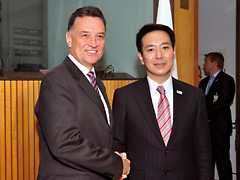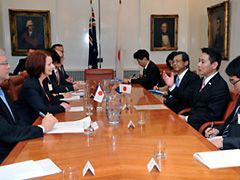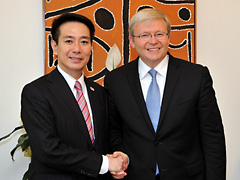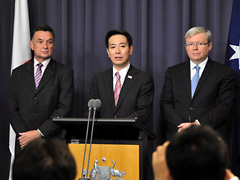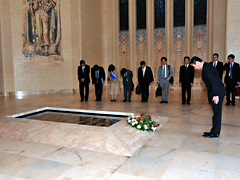Visit to Australia by Mr. Seiji Maehara, Minister for Foreign Affairs of Japan (Overview)
Mr. Seiji Maehara, Minister for Foreign Affairs of Japan, visited Canberra on Tuesday, November 23, and held meetings with Dr. Craig Emerson, Minister for Trade; Mr. Kevin Rudd, Minister for Foreign Affairs; Mr. Stephen Smith, Minister for Defence; and Ms. Julia Gillard, Prime Minister of Australia. Overviews of the meetings are provided below, followed by a summary of his visit to the Australian War Memorial.
[Points]
- Minister Maehara's visit to Canberra was the first capital visit made as a bilateral visit since his assumption of office, signifying Japan's policy of placing importance on Australia.
- Minister Maehara explained to the Australian side the Basic Policy on Comprehensive Economic Partnerships. Minister Maehara and Trade Minister Emerson agreed to launch negotiations for an Economic Partnership Agreement (EPA) between Japan and Australia. They also held discussions on the Trans-Pacific Partnership (TPP).
- Minister Maehara emphasized that Australia is an important country for the three pillars of Japan's economic diplomacy, namely, a free trade system, a stable supply of resources, energy, and foods, and development of infrastructure overseas; expressing his wish to enhance political dialogue with Australia in the areas of resources and infrastructure. Foreign Minister Rudd responded that Australia intended to negotiate a long-term stable supply of rare earth to Japan.
- Both Foreign Ministers agreed that upon further confirmation of factual information on North Korea's artillery attack against Yeonpyeong Island, they would respond to the incident in coordination with the Republic of Korea (ROK) and other countries concerned.
- Both Foreign Ministers, reaffirming cooperative relations between Japan and Australia, nations that have been playing a leading role in the area of nuclear disarmament and non-proliferation, released a joint statement (see attached) for the purpose of further enhancing such relations.
- Minister Maehara visited the Australian War Memorial and placed a wreath on the tomb of the Unknown Australian Soldier. He also paid a visit to the statue of Sir Edward 'Weary' Dunlop, an ex-prisoner of war.
[Overview]
1. Meeting with Minister for Trade Craig Emerson (Approx. 80 minutes from 11:15)
(1) Japan-Australia economic relations
Minister Maehara emphasized that Australia is an important country for the three pillars of Japan's economic diplomacy, namely, a free trade system, a stable supply of resources, energy, and foods, and development of infrastructures overseas. He expressed his wish to further reinforce Japan-Australia bilateral relations in these areas. For the areas of resource and infrastructure in particular, he stated that he hoped to enhance political dialogue with Australia. For his part, Minister Emerson indicated his recognition of the importance of their bilateral relations, stating that he intended to deepen cooperative relations with Japan still further.
(2) Japan-Australia EPA negotiations
Minister Maehara explained that he sought to accelerate efforts to conclude negotiations for a Japan-Australia EPA based on the Basic Policy on Comprehensive Economic Partnerships the Government of Japan has adopted recently. Minister Emerson, who held Japan's decision on the Basic Policy in high regard, agreed to strive to advance negotiations, stating his wish to launch the negotiations in their next meeting. They agreed that both countries would aim to convene the next negotiation meeting in early 2011.
(3) TPP
Minister Maehara stated that it is necessary to gather further information, and that Japan, while moving expeditiously to improve its domestic environment, will commence consultations with the TPP member countries. Minister Maehara requested Australia's cooperation in this process.
(4) WTO Doha Round
Minister Maehara expressed appreciation to Minister Emerson for his contributions to the APEC ministerial meetings. The Ministers confirmed their intention to cooperate for the success of the Doha Round negotiations.
2. Working Lunch with Minister for Foreign Affairs Kevin Rudd, joined by Minister for Trade Craig Emerson (Approx. 60 minutes from 12:45) and Meeting with Minister for Foreign Affairs Kevin Rudd (Approx. 80 minutes from 17:30)
(1) Opening remarks
At the start, Minister Maehara explained the reason for his visit to Australia, which was to seek to move a Japan-Australia EPA forward. He said that Canberra was the first foreign capital he had visited on a bilateral visit since he assumed the office of Minister for Foreign Affairs, and as such, his visit represented Japan's policy of placing an importance on Australia. In response, Foreign Minister Rudd, welcoming Minister Maehara's visit to Australia, stated that relations with Japan were of extreme importance for Australia.
(2) Reinforcement of Japan-Australia relations
a) Security cooperation
Aiming to reinforce security cooperation, the Foreign Ministers agreed to convene Japan-Australia Joint Foreign and Defense Ministerial Consultations next year, and also to accelerate the negotiations of the Japan-Australia information security agreement.
b) Japan-US-Australia cooperation
The Foreign Ministers, in order to enhance cooperation among Japan, the United States, and Australia for the stability of the region, agreed to consider holding a Ministerial Meeting of the Trilateral Strategic Dialogue (TSD) on the occasion of an ASEAN-related foreign ministerial meeting next July. The previous meeting was held in September 2009. They also agreed to reinforce the joint exercise initiative, which Japan, the United States, and Australia have carried out three times thus far, and to advance cooperation in areas such as disaster relief.
(3) Reinforcement of coordination in regional and global issues
a) Nuclear disarmament and non-proliferation
The Foreign Ministers reaffirmed cooperative relations between Japan and Australia, which have been playing a leading role in the area of nuclear disarmament and non-proliferation. These include the Foreign Ministers' Meeting on Nuclear Disarmament and Non-Proliferation that Japan and Australia co-hosted in September 2010. They released a joint statement (see attached) for the purpose of further enhancing such relations. The Ministers were in agreement to promptly coordinate their schedule so as to hold the 2nd Foreign Ministers' Meeting on Nuclear Disarmament and Non-Proliferation next spring in Berlin.
b) North Korea
Minister Maehara explained discussions he had with Mr. Stephen Bosworth, US Special Representative for North Korea, concerning North Korea's uranium enrichment activities, adding that careful responses were required. The Foreign Ministers, based on the understanding that the situation was serious, shared grave concerns, agreeing that Japan and Australia would continue to coordinate with each other while maintaining close consultations with the United States. They also agreed that it would be desirable for China to play a larger role in relations with North Korea.
Regarding North Korea's artillery attack against Yeonpyeong Island that had occurred just prior to their evening meeting, both Foreign Ministers, receiving factual reports as they came in during the meeting, agreed that upon further confirmation of facts, they would respond to the incident in coordination with the ROK and other countries concerned.
c) Fiji
Foreign Minister Rudd explained Australia's policy toward Fiji, including its refusal to recognize the current administration, which was inaugurated in a coup. In response, Minister Maehara stated that he had invited Mr. Ratu Inoke Kubuabola, Minister for Foreign Affairs, International Co-operation and Civil Aviation of the Republic of the Fiji Islands, to convey a strong message signaling the need for democratization when he visited Japan to attend a PALM Ministerial Interim Meeting in October. Minister Maehara explained to Minister Rudd that Japan considered that it was important to urge Fiji to hold free and fair general elections by 2014. The Foreign Ministers agreed on the importance of exchanging views on the democratization issue of Fiji with the United States and New Zealand, and decided to bring up the issue at the Ministerial Meeting of the Trilateral Strategic Dialogue (TSD) planned to be held next year.
3. Meeting with Minister for Defence Stephen Smith (Approx. 15 minutes from 15:30)
Minister Maehara and Minister Smith confirmed their intention to convene Japan-Australia Joint Foreign and Defense Ministerial Consultations next year and agreed to reinforce Japan-Australia security cooperation.
4. Courtesy Call on Prime Minister Julia Gillard (Approx. 30 minutes from 15:45, in Foreign Minister Rudd's attendance)
(1) Minister Maehara thanked Prime Minister Gillard for her contributions to the APEC meetings in Yokohama. He explained to the Prime Minister that the asteroid explorer Hayabusa, which had been on exhibition when Prime Minister Gillard observed it with Prime Minister Kan on the occasion of the APEC meetings, had brought back approximately 1,500 particles to Earth, presumably from the Itokawa asteroid. Minister Maehara extended appreciation for cooperation that Australia had provided thus far.
(2) Prime Minister Gillard welcomed the Kan administration's announcement of the Basic Policy on Comprehensive Economic Partnerships. She said she wished to deepen cooperation not only in trade but also in a broad range of areas, including security.
(3) Minister Maehara stated that Australia, a nation with a capacity to provide a stable and long-term supply of resources, was very important for resource-poor Japan. He explained that Trade Minister Emerson and he had agreed that day to launch negotiations for a Japan-Australia EPA seeking to further develop economic relations between the two countries. Minister Maehara furthermore expressed his wish to enhance cooperation with Australia in areas such as the securing of rare earth and development of infrastructure overseas, including the Shinkansen (bullet train). In response, Prime Minister Gillard acknowledged that rare earth was of strategic importance, and Foreign Minister Rudd indicated Australia's intention to provide a stable and long-term supply of rare earth to Japan.
(4) Lastly, Foreign Minister Rudd raised the whaling issue. Minister Maehara explained that Japan's scientific whaling was a legitimate scientific research activity conducted in line with the International Convention for the Regulation of Whaling. While expressing regret for Australia's action to file a suit at the International Court of Justice, he emphasized that he intended to manage the whaling issue carefully so as to prevent it from undermining good Japan-Australia relations as a whole.
5. Visit to the Australian War Memorial (Approx. 40 minutes from 14:30)
Minister Maehara visited the Australian War Memorial and placed a wreath on the tomb of the Unknown Australian Soldier. He also paid a visit to the statue of Sir Edward 'Weary' Dunlop, an ex-prisoner of war. In a joint press conference, Minister Maehara said, "There are some 22,000 people who were prisoners of war during the Second World War. I wanted to take the opportunity to express my feeling of apology towards those people by visiting the statue of Sir Dunlop."
Back to Index

